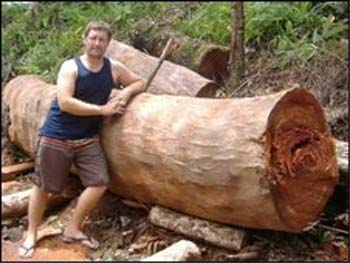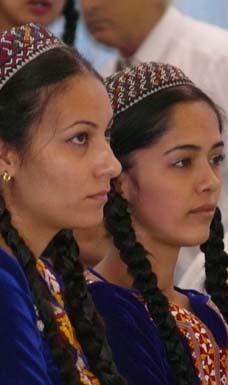
A former US Peace Corps volunteer, Paul Lane, has organised the inaugural canoe festival. For Paul, the canoes deserve to be celebrated in Yap, and around the world "The world's first ocean-going technology is the reason people got going," he says. For Paul the canoe symbolises "the wanting to explore, to go to new places - the need to explore, to go to new places- for the survival of humanity." The ancestors of today's Micronesians set sail from the Philippines and landed on these remote shores, thousands of years ago. "That's what it's all about," Paul says. "People needed to find new places."
RPCV Paul Lane organised Yap's first annual canoe festival
Yap revives ancient art of star sailing
By Ben Lowings
BBC News, Yap
Traditional Yapese outrigger canoe
The traditional canoes are built without using nails, blueprints or measuring tapes
The ancient skills of building ocean-going canoes and sailing them by star across great distances are being revived on the Pacific island of Yap, as the BBC's Ben Lowings reports.
In the mangrove woods on the shores of Yap, part of Micronesia, canoe-builders are busy with adzes and saws.
Groups of men - young and old - are standing on a carpet of wood shavings, fashioning local timber.
As Chief Tharngwan looks on, the teams put together the vessels, ready for the first annual canoe festival of the Yap Traditional Navigation Society.
No nails are used, nor blueprints or measuring tapes - just a leaf from a coconut palm.
Chief Tharngwan places the leaf on the side of the hull and designates a cut with a sweep of his pencil. It is evidence that the Micronesian voyaging canoe is literally a design taken from nature.
Deep ocean sailing
As the festival gets underway, in Colonia, the capital of Yap State, Yapese women will dance in grass skirts, with strands of red, yellow and green livery.
An open-ocean voyage has been planned and smaller canoes will be raced on the smoother waters within the Yap reef.
Watching from the shore, dozens of sailors and enthusiasts are expected from Yap's outer atolls, Guam and the neighbouring states of Micronesia.
Master Navigator Ali Haleyalur
Each island has a star above it... There is a star above this island. And there is a star above that place. And I steer between the two
The drink of choice will be tuba - gallons of the liquid have been prepared for visitors and participants. It is a wine made from the fermented sap of the coconut palm.
The celebration marks a revival of what was the world's first ocean-going technology - and the navigational methods used to steer the canoes across the vast Pacific.
Master Navigator Ali Haleyalur teaches the art of celestial navigation. He is from the Yapese outer islands of Lamotrek and Satowal.
He sails in the traditional manner - by the stars, winds and currents. He does not use maps, or star-charts.
He points to his head. "It's all in here," he says.
Marshall Islanders, Ali says, are the only Micronesians who make physical charts of any kind - and even these are only made of sticks and pebbles lashed together.
"There can only be one master navigator on each island," he says.
It will be many years before he chooses one of his students to take over his role. Even now, those students are keeping watch at night for him on the occasional inter-island trip. But he is the captain for now.
He has sailed thousands of miles across the deep ocean.
A whale surfaced under his canoe on a recent trip to the neighbouring nation of Palau, about 400km (250 miles) from Yap.
The canoe was lifted out of the water on the whale's back. But his crew's prayers were eventually answered, he says, and the whale swam away.
Island stars
How do you sail on the deep ocean, without charts, lifejackets or radios?
Traditional Yapese outrigger canoe
The canoes can be navigated across wide areas of open ocean
Mr Haleyalur laughs gently when I ask him if he keeps a GPS device as a backup. "No GPS," he smiles broadly.
Then, in his soft-spoken manner, this big man lets me in on the basics of celestial navigation.
It is a lesson, I imagine, in the same style as his quiet mutterings to his young initiates, on a starry night miles from land.
"Even if you can't see the island on the water, you can see the island," he explains.
The stars nearest the horizon do not wheel around the sky as do those higher up.
"Each island has a star above it," Mr Haleyalur continues. "I sail through one place. There is a star above this island. And there is a star above that place. And I steer between the two."
In essence, the navigator uses the stars as directional tools, to plot a course between islands - even if those islands are only a few kilometres wide, and hundreds of kilometres away from the boat.
Valuable transportation
Ancient sailing and boatbuilding skills have been in decline for decades.
But Mr Haleyalur is part of a new education programme now under way in Yap to try to reverse this trend.
Yapese man sailing traditional canoe
Many young Yapese are not so interested in sailing traditional canoes
The Yapese boat builders are using the same skills as their forebears - who came here by boat.
"We are constructing two types of canoe," Mr Haleyalur says.
"One type from the outer islands - we are building paddling canoes from the outer islands, and voyaging canoes - very big ones."
Islanders rely on marine outboard motors and imported fibreglass hulls when available. But Mr Haleyalur says sailing canoes are a realistic alternative transport for young islanders.
"I believe we can use our canoes. We can move about between two places. In some places it's the only method of transportation. We don't want to lose this. We want to keep them alive."
'Finding new places'
There have been problems getting young people interested. But it was Mr Haleyalur's students in their 20s - involved in the canoe school - who took me out in their 20-foot outrigger canoe.
Underneath the tropical sun, we went out into the lagoon.
The crew of three young men were surefooted, in tune with the movement of the boat. Their arms and legs cast strong shadows on the deck, almost seeming like part of the boat's rigging itself.
Paul Lane
Paul Lane organised Yap's first annual canoe festival
A former US Peace Corps volunteer, Paul Lane, has organised the inaugural canoe festival. For Paul, the canoes deserve to be celebrated in Yap, and around the world
"The world's first ocean-going technology is the reason people got going," he says.
For Paul the canoe symbolises "the wanting to explore, to go to new places - the need to explore, to go to new places- for the survival of humanity."
The ancestors of today's Micronesians set sail from the Philippines and landed on these remote shores, thousands of years ago.
"That's what it's all about," Paul says. "People needed to find new places."












